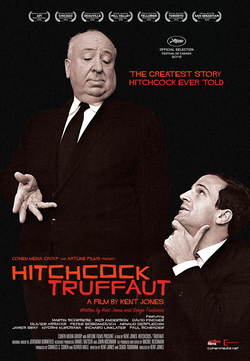HITCHCOCK/TRUFFAUT
In 1962, Alfred Hitchcock fanboy Francois Truffaut got to spend a whole week with his hero, analyzing and examining every film the Master made. From that came the legendary book Hitchcock/Truffaut or to use the translated French title, The Cinema According to Alfred Hitchcock. Truffaut's book became a seminal textbook for future film auteurs and did much to elevate Hitchcock, then appraised as a mere entertainer, into one of the preeminent filmmakers of all time.
I'm being a touch flippant here, but at times I feel the need to knock down artistic pronouncements that run the risk of mummifying film as something to enjoy as well as study. Hitchcock/Truffaut is not so much about the making of the book or about the two respected filmmakers. It is a well made film about how Hitchcock has more than earned his place in the pantheon of great directors and can be a good primer for anyone interested in the art of cinema.
In 1962, French New Wave director and former Cahiers du Cinema film critic Francois Truffaut came to America, almost in pilgrimage, to pay homage to his favorite director: Alfred Hitchcock. Truffaut's selection of Hitchcock as a major director and even artist shocked many, particularly the American film intelligentsia, which regarded Hitchcock as a good director but nowhere near an artist, let alone someone to rank alongside someone like a Truffaut.
Nevertheless, Truffaut was adamant about his admiration for Hitchcock's work, and requested an audience. Hitch, fresh off his success with Psycho, agreed to a taped interview where over the course of a week, Truffaut would ask questions in French and Hitchcock would answer in English, with Helen Scott translating. Transcribed and published in 1966, Hitchcock/Truffaut became a Bible of sorts to many future filmmakers. Hitchcock/Truffaut has many of those influenced by either the book or the directors reflecting on both, ranging from Wes Anderson and David Fincher to Martin Scorsese.

If there is a flaw in Hitchcock/Truffaut is that for all the influence the book had, we do not see it actually reflected in the work of those who speak of it. We see much of Hitchcock's work, with specific focus on Psycho and Vertigo, but oddly whatever influence direct or indirect he had on Truffaut's work is not delved much into. The only Truffaut films I recall being brought up were The 400 Blows and Jules et Jim. Granted, there weren't that many Truffaut films when he did his legendary interview, but one would have hoped that Hitchcock/Truffaut director Kent Jones would have perhaps touched on how strong Hitch's oeuvre was to his future work.
Same goes for any film from any of the interviewees. I don't think we needed to see say an Anderson or Richard Linklater show where they paid 'homage' to Hitchcock's work, but as much as they talk about how important his work was and how they learned from him or the Hitchcock/Truffaut book, one does not actually see how either found their way into their work.
In a curious way, Hitchcock/Truffaut comes across, as I said in the beginning with a touch of flippancy, a fanboy meeting his hero. Truffaut comes across as someone who never saw any flaws in Hitchcock's films on any level. Even as we close out the film, when we see Truffaut speaking at Hitchcock's American Film Institute Lifetime Achievement Award (which I figure would not have happened without Truffaut among others championing Hitch as a major artist), Truffaut comes across almost as belligerent, demanding we all worship his God as he worships Him.
"In America, you call him 'Hitch'. In France, we call him 'Monsieur Hitchcock'", he all but thunders at us as Hitch is tottering on the dais, a feeble old man long past his glory days.
The same goes for the film, which won't touch anything that The Master of Suspense might have done wrong technically or any other way. Even though such things as gender equity were an unknown subject at the time, Hitchcock's behavior towards Tippi Hedren either on or off-screen were not going to be touched let alone mentioned. The book and film are not about such things.
We also get to hear a lot about their friendship post-interview, and how they advised each other's work. One wonders what Hitch told Truffy regarding Day for Night or whether Francois advised Al to go light on Family Plot. Might have been nice if Truffy had told Hitch to tone down the rape in Frenzy, but that's just me.
However, Hitchcock/Truffaut is a good film to learn about what makes Hitchcock films so extraordinary, a nice Brief History of Hitchcock if you like. It can serve as an informal film class that is easy to watch and easy to understand. It even gives strong advise about how in Hitchcock's words, 'there is a tendency among filmmakers to forget the audience'. I've found that to be quite true.
Hitchcock/Truffaut might also whet the appetite of any budding film critic or filmmaker, and if it serves that purpose, then it is a masterful success. Short, perhaps slight, Hitchcock/Truffaut is good enough as a history/film lesson to make one interested in such things seek it out.
 |
| Francois Truffaut: 1932-1984 Sir Alfred Hitchcock: 1899-1980 |
DECISION: B+

No comments:
Post a Comment
Views are always welcome, but I would ask that no vulgarity be used. Any posts that contain foul language or are bigoted in any way will not be posted.
Thank you.